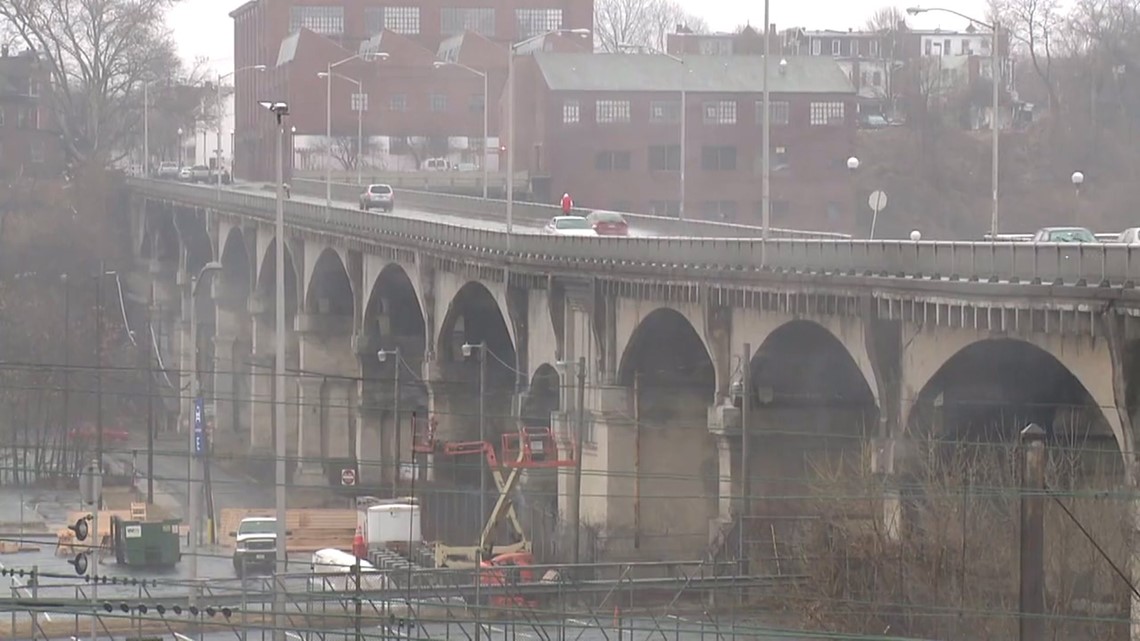

State civil engineers released a new report today assessing 16 categories of infrastructure ranging from roads to wastewater, finding only three sectors that rise to a “B” grade. The comprehensive report, titled the 2014 Report Card for Pennsylvania’s Infrastructure, was developed by the Central Pennsylvania Section of the American Society of Civil Engineers (ASCE) in cooperation with other engineers across the state, and awarded the state’s infrastructure 7 “D”s, 6 “C”s, and 3 “B”s. The lowest grade awarded was a “D-”, which went to the Commonwealth’s roads and wastewater systems. The Report Card’s highest grade, a “B,” was given to Pennsylvania’s freight rail system. The cumulative GPA of Pennsylvania’s infrastructure was a “C-”, a grade unchanged since the last report card in 2010.
The Report Card finds that Pennsylvania faces immense challenges to maintaining and modernizing infrastructure throughout the state:
- Pennsylvania has the highest percentage of structurally deficient bridges in the country. Of the Commonwealth’s more than 22,000 bridges, nearly one in four are considered structurally deficient.
- Pennsylvania has the most combined sewer overflows (CSOs) of any state.
- The Commonwealth must invest $28 billion over the next 20 years to repair existing wastewater systems, meet clean water standards and build or expand existing systems to meet increasing demands
- Pennsylvania’s 1.3 traffic fatalities per 100 million miles of travel is significantly higher than the national average (1.1).
“Our state leaders here in Harrisburg understand that our roads, wastewater treatment plants and dams need some updates, and we’ve made some progress in the last four years.” said Jason Bowes, EIT, President of the ASCE Central PA Section. “The new Report Card demonstrates that Pennsylvania’s elected officials shouldn’t declare victory just yet. Now we must ramp up investment in Pennsylvania’s future in order to build a modern system for a modern economy.”
State civil engineers awarded the state’s infrastructure a cumulative grade of “C-” based on 16 categories. A team of volunteer civil engineers assessed hundreds of public records over the course of the past year to complete the Report Card. Category grades included: dams (C-), inland waterways (D+), parks and recreation (B-), freight rail (B), roads (D-), levees (C-), energy (C), hazardous waste (B-), ports (C+), stormwater (D+), bridges (D+), drinking water (D), schools (C-), solid waste (C+), wastewater (D-), and transit (D).
There were several bright spots in the report as well, notably that action has been recently taken on boosting funding for transportation with Act 89, and that Pennsylvania is a leader in employing technology solutions to improve transportation services.
“From Harrisburg to Washington D.C., we are seeing the growing challenge our leaders face when combated with deteriorating roads and bridges amidst flat-lining budgets” said Randall Over, P.E., President of the American Society of Civil Engineers. “The costs of inaction are real. Much like a leaky roof on a home, when it comes to our roads and water systems, costs will only grow the longer we wait to act.”
The report also comes at a time when the nation is facing a rapidly depleting Highway Trust Fund, which is expected to reach insolvency at the end of August. For Pennsylvania, 46 percent of the Commonwealth’s capital outlays come from the federal government. Simply put, as the Report Card clearly shows, Pennsylvania cannot afford to let the Highway Trust Fund become insolvent.
The Pennsylvania Report Card was created as a public service to the citizens and politicians of the Commonwealth to inform them on the infrastructure needs in their community. By using school report card letter grades, civil engineers have used their expertise to condense complicated data into easy to understand analysis.
ASCE’s state-level Report Cards are modeled after the national 2013 Report Card for America’s Infrastructure (www.infrastructurereportcard.org), which gave America’s infrastructure a grade of D+.
To view the full version of the 2014 Report Card for Pennsylvania’s Infrastructure, please visit www.pareportcard.org.
